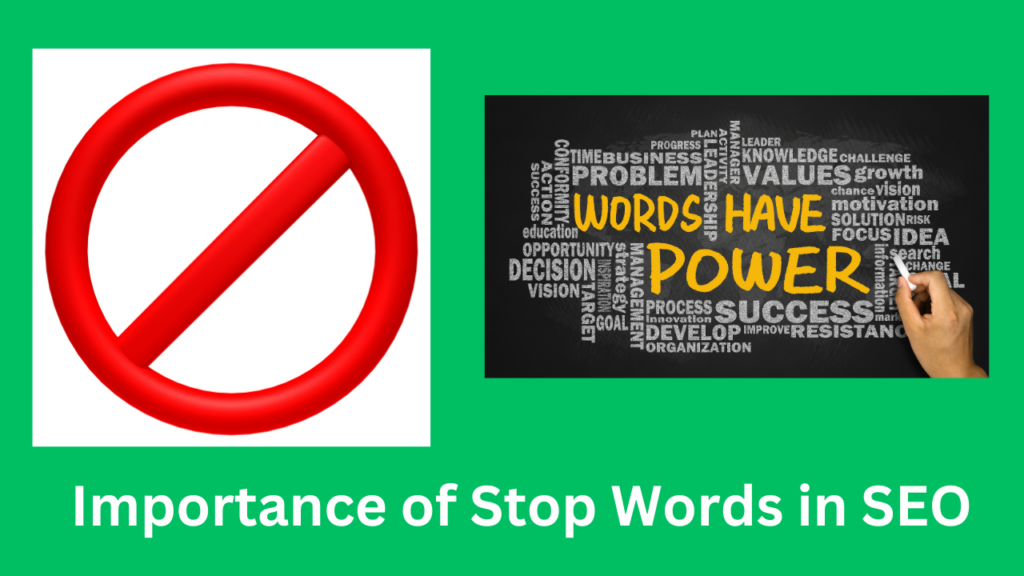Friends, have you ever read an article that doesn’t contain any stop words? Probably not because most bloggers use stop words, and stop words are also very important for SEO.
But have you ever thought about what stop words are and why they are necessary for SEO? Some of you may already know about stop words, but those who don’t will understand it thoroughly after reading this article.

According to research, any article, document, or other text is considered incomplete without stop words. That’s why all bloggers use stop words in their articles. However, 45% of bloggers make mistakes in using stop words in their content, which can cause problems for readers in understanding their articles.
Have you ever considered that Google can ignore stop words? If not, you will find the answer to this question in this article.
Stop words are made up of words like pronouns, prepositions, or conjunctions. These words play an important role in content without changing the body language. This is why they have a special place in SEO. If you don’t use stop words properly in your posts, it can have some impact on your website.
So, if you want to understand stop words properly, read this article to the end because I will explain in detail what stop words are, why they are important in SEO, whether you should use stop words in URLs or not, and provide a list of 50 stop words. Let’s start with the question, “What are stop words?”
What Are Stop Words
Stop words are also known as common words, such as ‘a’, ‘and’, ‘how’, ‘or’, ‘in’, but are often ignored during searches.
For example, when you type “What is a Sitemap?” on Google’s search engine, Google’s algorithm focuses more on “Sitemap,” and the search results are based on this emphasis.
For your information, stop words were first introduced by Hans Peter Luhn, a well-known figure in the field of information retrieval. He stated that stop words are not limited to the English language but are a group of commonly used words in all languages.
Most bloggers start using stop words without understanding them properly, resulting in a slight degradation of the user’s experience with their articles.
Can you use stop words in your article?
After understanding what stop words are, you should also know whether you can use stop words in your article or not. In fact, you should use stop words in your articles because without stop words, you won’t be able to make your articles understandable to your visitors.
You probably already know that when many visitors come to your website, if your articles don’t include stop words, it can lead to a lack of understanding among your visitors. This can potentially result in a decrease in traffic to your website. Therefore, it becomes crucial to use stop words in your articles because stop words help your visitors better understand your articles.
If your website experiences an increase in traffic, your website’s chances of ranking higher on search engines also increase. It can be said that a website’s ranking is also dependent on stop words. By now, you must have understood how important it is to use stop words in your articles.
Why are stop words essential in SEO?
Now that you know what stop words are, let me explain why stop words are essential in SEO. You are aware of the significance of SEO. Without proper SEO, a website cannot rank effectively.
In SEO, using stop words is also crucial because it enhances the user experience. If you still haven’t grasped it, no worries; I’ll explain. If you don’t use stop words in your articles, your website visitors may face difficulties in understanding your articles.
When your visitors cannot comprehend your articles, they might not prefer to return to your website. Therefore, you need to remember that whenever you prepare an article, you should incorporate stop words.
By doing so, your website’s visitors can easily understand your articles, ultimately improving user experience. Better user experience plays a crucial role in achieving a higher ranking on search engines. Hence, it is vital to include stop words in your articles.
Because you need to create articles with your visitors in mind, so that they can understand your articles at a glance. If you stop using stop words in your articles, your website’s ranking on search engines may drop rapidly. This illustrates how important and necessary stop words are in SEO. Therefore, you should always use stop words in your articles.
Does Google ignore stop words?
After learning what Stop Words are and why they are essential in SEO, it’s easy to understand the following: Does Google Ignore Stop Words?
The answer is yes. Google ignores Stop Words in both search queries and search results. For instance, when you search for a topic or keyword on a search engine, you can include or exclude Stop Words without affecting the search results. For example, “On Page SEO in Hindi” and “On Page SEO Hindi” mean the same thing. Search engines ignore these Stop Words when crawling articles. However, this does not mean you should neglect using Stop Words in your content.
If someone thinks this way and acts on it, their website’s ranking may suffer in the future. This would negatively impact the visitors to their website. As I mentioned earlier, if you’ve read this carefully, you will understand. Here’s one line to clear any confusion:
If you don’t use Stop Words in your articles, it will affect the user experience. You need to use Stop Words to help your visitors better understand your article. Because it’s the visitors who contribute to your website’s good ranking on search engines. Now you should understand that Google does ignore Stop Words.
Should Stop Words Be Used in URLs?
Should Stop Words Be Used in URLs? After understanding what Stop Words are, it’s important to know whether it’s appropriate to use Stop Words in URLs. Let me provide you with some detailed information on this.
You probably know what a URL is. When you prepare your article, you also create a URL for it. If you’re a WordPress user, you’ve likely seen the Permalink option where you can create a URL.
When crafting your URL, remember that it should not be too long because search engines don’t favor lengthy URLs. Therefore, try to keep your URLs as short as possible by using important keywords.
In addition, it’s advisable to avoid using Stop Words in URLs. Search engines ignore Stop Words, so using them in your URLs won’t provide any benefit. Whether there are Stop Words in your URL or not, your article still appears in search results.
Using Stop Words in URLs makes them longer, which isn’t visually appealing. This can have a negative impact on both visitors and search engines. It’s better to create short, user-friendly URLs that are easy to read and remember. Now, you should understand what Stop Words are and why you should avoid using them in URLs.
list of 50+ Stop Words
As you have already learned what Stop Words are and how essential they are in SEO, you must have a good understanding of this topic. There are numerous Stop Words, and I will provide you with a list of 50+ Stop Words. These 50+ Stop Words are as follows:
You can easily use these various Stop Words in your articles. By incorporating Stop Words into your content, you will continue to attract good traffic to your website, leading to an enhanced user experience. Now, let me present to you this list of 50+ Stop Words:
| 1 | ago |
| 2 | above |
| 3 | according |
| 4 | after |
| 5 | again |
| 6 | am |
| 7 | are |
| 8 | any |
| 9 | at |
| 10 | be |
| 11 | been |
| 12 | before |
| 13 | between |
| 14 | being |
| 15 | both |
| 16 | but |
| 17 | by |
| 18 | can |
| 19 | come |
| 20 | could |
| 21 | do |
| 22 | does |
| 23 | did |
| 24 | done |
| 25 | each |
| 26 | end |
| 27 | etc |
| 28 | every |
| 29 | far |
| 30 | for |
| 31 | from |
| 32 | go |
| 33 | goes |
| 34 | gone |
| 35 | get |
| 36 | he |
| 37 | has |
| 38 | have |
| 39 | had |
| 40 | hello |
| 41 | how |
| 42 | if |
| 43 | in |
| 44 | is |
| 45 | just |
| 46 | keep |
| 47 | know |
| 48 | last |
| 49 | like |
| 50 | later |
| 51 | look |
| 52 | made |
| 53 | me |
| 54 | miss |
| 55 | more |
| 56 | my |
| 57 | name |
| 58 | near |
| 59 | no |
| 60 | next |
| 61 | on |
| 62 | off |
| 63 | ok |
| 64 | old |
| 65 | please |
| 66 | plus |
| 67 | quite |
| 68 | right |
| 69 | round |
| 70 | so |
| 71 | sorry |
| 72 | thanx |
| 73 | use |
| 74 | very |
| 75 | with |
| 76 | yes |
You can use all of these Stop Words in your articles and create content that helps your visitors better understand your articles. This will, in turn, enhance your website’s ranking on search engines.
Conclusion: Do you really need Stop Words?
After reading this article, you must have understood what Stop Words are and how important it is to use Stop Words in an article. Many people may not have extensive knowledge about Stop Words, so I have provided information about them in this article.
Having Stop Words in your article is essential for ranking on search engines. However, remember that you should not use Stop Words in your article’s URL. Creating a well-structured URL is crucial for your article to achieve better rankings.
In this article, I discussed what Stop Words are, why they are important in SEO, and provided a list of 50+ Stop Words. If you have read and understood this article, you can easily improve your website’s ranking on search engines.
I hope you found this article helpful. If you did, please share it with those who might need it. If you have any questions or didn’t understand something, feel free to ask by commenting below. I will do my best to help you with your queries.
FAQ: SEO में Stop Words प्रयोग करने की गाइड
When I was researching Stop Words on the Internet, I noticed that there were numerous questions and problems related to “Stop Words kya hain.” In this article, I’ve provided answers to some of the essential questions, which are as follows:
Q. 1 How are Stop Words used in searching?
Ans. Understanding how to use Stop Words in searching is not that difficult. Let me explain it to you easily. When you enter a keyword in the search bar of a search engine, whether you include Stop Words or not, the search engine provides you with the same results. For example, if you search for “What is Technical SEO in Hindi” or simply “Technical SEO Hindi,” you will get the same search results. This is because search engines ignore Stop Words.
Q. 2 If there are Stop Words in the URL, will the article still rank?
Ans. You might be wondering whether an article with Stop Words in the URL will still rank or not. Here, I’ll clarify that even if there are Stop Words in the URL, the article can still rank. However, its ranking might be slightly affected. As mentioned earlier, long URLs are not preferred, and search engines give more importance to shorter URLs. So, try to avoid Stop Words in the URL to maintain better rankings.
Q. 3 Are Stop Words useless for SEO?
Ans. If you’re wondering whether Stop Words are good or bad for SEO, it’s essential to understand that they don’t have a significant effect on SEO, neither positively nor negatively. Search engines ignore Stop Words, so you don’t need to dwell on them too much. However, not using Stop Words in your content can make it challenging for visitors to understand your articles, which, in turn, can lead to a drop in your website’s search engine ranking. To enhance the user experience and ensure your website ranks well, it’s essential to use Stop Words in your articles. After all, if your website doesn’t rank well, creating it may not serve much purpose. You should understand this point by now.




सर, इतने दिन से सुन रहा था स्टाॅप वर्ड के बारे में लेकिन आज पुरी डिटेल्स में जानकारी पढ़कर इसके बारे में सब Clear हो गया , बहुत हि Deep और Knowledgeble Post हैं ,धन्यवाद सरजी !
sir maine bhi url me stop words use kiye hai jisse url bahut lambi ho jati hai